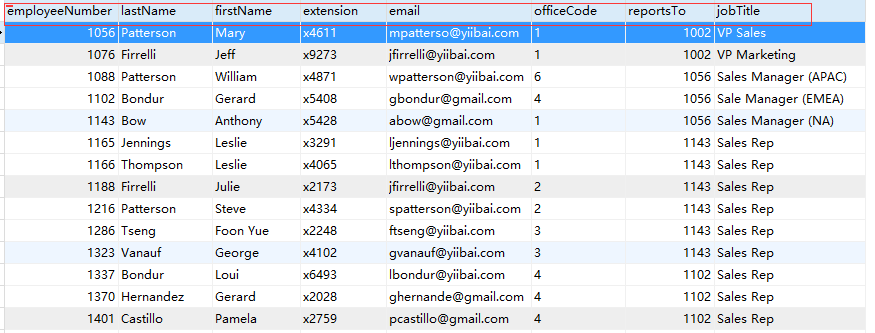MySQL-查询数据(SELECT)
SELECT语句用于从表或视图中获取数据
Select语句组成 Select 之后是逗号分隔列或星号(*)的列表,表示要返回所有列。 From 指定要查询数据的表或视图。 Join 根据某些连接条件从其他表中获取数据。 Where 筛选条件,过滤结果集中的行。 Group By 将一组行组合成小分组,并对每个小分组应用聚合函数。 Having 过滤器基于Group By子句定义的小分组。
Order By 指定用于排序的列的列表。
Limit 限制返回行的数量。
SELECT语句实例应用:

SELECT lastname, firstname, jobtitle From employees; #从employees表中取lastname,firstname,jobtitle三列数据
SELECT * From employees; #从employees表中取所有列数据
对数值进行搜索
SELECT * from where score>90; #显示分数大于95的信息
对字符串值进行查找
SELECT first_name From employees where first_name='Tom'; #找出姓Tom的员工
多类型条件组合查找
SELECT last_name,first_name,birth,state from employees where birth<'1995-2' and (state='VA' or state='BA');
NULL值特殊处理(各种操作符不能对NULL值进行处理)
NULL值查找采用is null或is not null
SELECT first_name,birth from employees where death is null
查询结果排序
SELECT last_name,first_name from employees order by state DESC,last_name ASC #先按出生地降序排列,同出生地按姓氏升序排列
http://blog.sina.com.cn/s/blog_5e45d1be0100i0dg.html
MySQL还可以把表达式的计算结果当作输出列的值
常用的日期操作:
MySQL中,年份是处于最前面的。
1.按日期进行排序
SELECT * from employees where time between '2015-6-1' and '2016-6-1'
SELECT * from event where date=’2002-10-01’
2.查找某个日期或日期范围
SELECT last_name,first_name,birth,state from employees where death>'1990-1-1' and death<'2000-1-1'
3.提取日期中的年,元,日各个部分三个函数(year,month,dayofmonth可分离出日期中的年月日)
SELECT last_name,first_name,birth,state from employees where where month(birth)=7 and dayofmonth(birth) =6;
4.用一个日期求出另外一个日期(to_days可以把日期转换为天数)
SELECT last_name,first_name,birth to_days(death)-to_days(birth) as age from president
SELECT last_name,first_name,expiration from member where(to_days(expiration)-to_days(curdate())<60
模式匹配
模糊查询(使用like和not like加上一个带通配符的字符串)
通配符”_”(单个字符)和”&”(多个字符)
SELECT concat(first_name,' ',last_name) as name,
where last_name like 'W%'; #找到W或w开头的人
where last_name like '%W%'; #找到名字里W或w开头的人
限制查询结果数据行个数
SELECT last_name,first_name,birth,state from president
order by birth limit 5; #只想看前5个
order by birth limit 10,5; #返回从第11个记录开始的5个记录(跳过了10个)
小技巧:从president表中随机找出一个值:
SELECT last_name,first_name,birth,state from president
order by rand() limit 1; #这是用了表达式求值的方法
生成统计信息
1.查询结果中重复数据清洗(distinct)
SELECT distinct state from president #查询美国总统来自哪个州(不计入重复数据)
2.count()函数统计相关记录的个数
使用方法:count(*)计算所有,NULL也要
count(数据列名称),NULL值不计算在内
SELECT count(*) from president;
3.分类统计(count函数结合group by)
方法1:
SELECT count(*) from student where sex=’f’;
SELECT count(*) from student where sex=’m;
方法2:
SELECT sex,count(*) f rom student group by sex;
复杂应用:
查看总统出生最多的前4个州
select state,count(*) as count from president group by state order by count desc limt4;
多张表数据提取
数据库可利用“关系”来综合多个数据表里面的记录,这种操作称之为“关联”或“结合”
SELECT需要给出多个数据表里面的信息(不可重复);
From需要知道从哪几个表里面做事;
where则对几个表之间的关联信息作出详细的描述。
1.数据列引用方式:数据表名.数据列名
查询某一天内的学生们的考试成绩,用学号列出
SELECT scroe.student_id,event_date,score.score.event.type
From event,score
where event.date=’2003-09-12’ and event.event_id=score.event_id
首先,利用event数据表把日期映射到一个考试事件编号,再利用这个编号把score表内相匹配的考试分数找出来。关联两个表,完成查询。
查询某一天内的学生们的考试成绩,用姓名列出
SELECT student.name event.name,score.score,event.type
From event,score,student
where event.date=’2003-09-12’ and event.event_id=score.event_id and score.student_id=student.student_id;
查询一下缺席学生的名字,学号,缺席次数
SELECT student.student_id,student_name
count(absence.date) as absences
From student,absence
where student.student_id=absence.student_id //关联条件
group by student.student_id;




